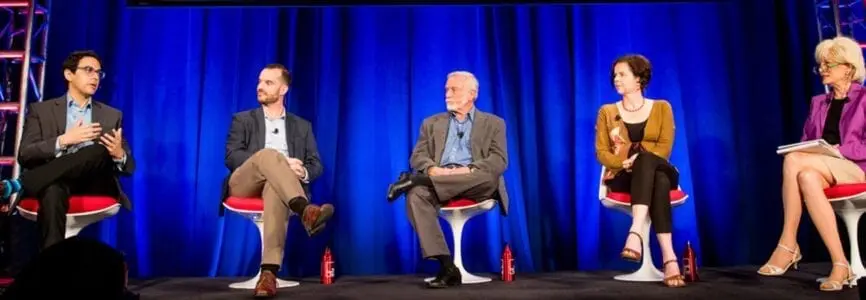Hastings Center News
World Science Festival Features Hastings Scholars on Gene Editing
Where do we draw the line between safe and dangerous applications of CRISPR, the gene editing technology that allows us to make permanent, even heritable, changes to the genetic code? How should scientists approach public engagement before field testing genetically modified crops in and around communities? These and other questions were addressed by Hastings Center director of research Josephine Johnston and research scholar Carolyn Neuhaus at two sessions at the World Science Festival, a public event in New York City, on May 31.
Johnston was a panelist in “Rewriting Life: The Promise and Peril of Editing your DNA,” which was moderated by “60 Minutes” correspondent Lesley Stahl. Other panelists were Neville Sanjana, a bioengineer and geneticist at New York University who studies the genomic impacts on the nervous system and cancer evolution, Sam Sternberg, a biochemist at Columbia at co-author with CRISPR pioneer Jennifer Doudna of A Crack in Creation: Gene Editing and the Unthinkable Power to Control Evolution; and Fred Gould, a biologist who studies the genetics of insect pests and crops and co-director of North Carolina State University’s Genetic Engineering and Society Center.
The panel discussed the vast applications of CRISPR, including its potential to help improve agricultural yields, mitigate the spread of communicable disease, and eliminate certain genetic diseases in humans. “Because it’s a platform technology with so many different uses, it’s not just a good or bad technology,” said Johnston. But people have expressed many concerns, she said, including “how appropriate it is for humans to have such control over the genes of ourselves, our children, or animals, and to what ends?”
Johnston underscored the need for public deliberation about exactly what those ends are. “For instance, you could be looking to get rid of deafness, which some people consider to be a difference and not a disability . . . that’s exactly the kind of thing that could be edited,” she said. “There will be this need for us to honestly examine the ends we are pursuing, and what kinds of definitions of the good human and the good person and health get forefronted and what kinds of definitions get lost along the way.” Watch the video of the panel.
Neuhaus was a panelist on “Planting the Seeds, Seeding the Plants: Can CRISPR Save the World?” Journalist and author Brooke Borel moderated the session, which also included Dave Jackson, a research scientist at Cold Spring Harbor Laboratory in New York; Yiping Qi, a biologist at the University of Maryland, College Park; Friedrich Soltau, a senior sustainable development officer in the United Nations Department for Economic and Social affairs ; and Mathew R. Willman, a plant geneticist at Cornell University.
The panel discussed CRISPR applications in agriculture, including the potential to engineer crops with better nutritional content and higher yields, and to reduce the need for pesticides. However, there has been significant social and cultural apprehension surrounding genetically modified organisms. Even though CRISPR products are not regulated as GMOs in the United States, Neuhaus emphasized the need for meaningful public deliberation among scientists and communities to address safety and ethical concerns. It is important for scientists to understand the social and cultural contexts surrounding the application of gene edited crops, she said, not just the legal rules that regulate their use.
Hastings research scholar @carolynpneuhaus joins @brookeborel, David Jackson, Yiping Qi, @firedupfred, and @PlntTransformer at #WSF18 to discuss whether we should “tinker with nature to save it.” pic.twitter.com/ppx0zDz6fa
— Hastings Center (@hastingscenter) May 31, 2018

